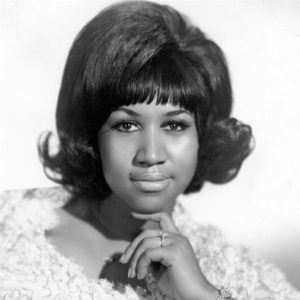
Aretha Franklin was hailed for decades as the Queen of Soul, but in her time many also viewed her as the Queen of the Blues. To many more her gospel fervor, striking intimacy, vocal range, and impeccable timing and control made her simply the greatest singer ever, regardless of genre. Franklin recorded her first sides a gospel singer for the J-V-B label in Detroit in 1956, following the path of her father, the famous preacher Reverend C.L. Franklin. She began her secular career by singing “Today I Sing the Blues” on her debut session for Columbia Records, in 1960. The single hit No. 10 on the Billboard magazine R&B charts, the first of over 100 singles to chart in addition to dozens of albums. She sounded as natural and masterful singing the blues as soul and pop songs, and in fact, a number of her hits were in essence blues even if they weren’t commonly perceived so. In 1998 Rhino Records took the cue and compiled an album from her Atlantic recordings entitled Aretha’s Blues: The Delta Meets Detroit.
Aretha wasn’t from the Mississippi Delta, but her father was. He moved the family to Memphis, where she was born on March 25, 1942, then to Buffalo and finally to Detroit, where he rose to fame with sermons at the New Bethel Baptist Church that were recorded and released on J-V-B and Chess. Reverend Franklin’s religion did not prevent him from embracing other types of music, and Aretha and her singing sisters Carolyn and Erma met many R&B and jazz performers in their home or at events with their father. It was Reverend Franklin who guided Aretha to sign with John Hammond at Columbia.
Among her Columbia albums was Unforgettable: A Tribute to Dinah Washington, recorded after the death of the singer who once held the Queen of the Blues title. Later Columbia retrospectives gathered tracks from various albums under the titles Today I Sing the Blues and Aretha Sings the Blues in the U.S. and Blues Sister in Brazil. Much of Columbia output consisted of pop, jazz, standards and show tunes, however, and Franklin didn’t hit her soul/blues stride until she signed with Atlantic. There her first 45, the bluesy I Never Loved a Man (The Way That I Love You), immediately hit No. 1, and another No. 1 single was her cover of Bobby Bland’s Share Your Love With Me. Dr. Feelgood (the flip side of Respect) became a standard in the repertoire of blues women, and many blues bands continue to perform Chain of Fools and other Franklin hits. Her other Atlantic blues tracks on Atlantic include Night Time is the Right Time, Come Back Baby, The Thrill Is Gone, Honest I Do, Ramblin’, Pitiful, Drown in My Own Tears, You’re Taking Up Another Man’s Place, Ain’t No Way, Good to Me As I Am to You, and stirring love versions of Dr. Feelgood.
In his liner notes to Franklin’s 1968 Lady Soul album, Jon Landau, a writer for Rolling Stone and future manager of Bruce Springsteen, wrote: “Aretha Franklin sings the blues. But is a blues with a difference . . . Aretha has put together the winning style which has made her the most important blues artist of today.”
Aretha Franklin, who was showered with honors and awards during her long and fruitful reign, died at her home in Detroit on August 16, 2018.
